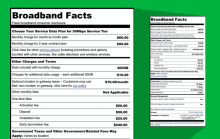Maps, Maps Everywhere - Episode 528 of the Community Broadband Bits Podcast

This week on the podcast, Christopher is joined by Dustin Loup, Project Manager of the National Broadband Mapping Coalition, housed at the Marconi Society. Dustin joins us to talk about the new national Federal Communications Commission broadband maps, currently under construction and intended to replace the current and hopelessly broken one to prepare for tens of billion in federal broadband funding.
There will hopefully be many improvements in the new maps, the first version of which is due out this month (we're not holding our breath): more granular data, more precision, and a better picture to drive future infrastructure investment in smart, efficient ways. Christopher and Dustin talk through what they hope to see, before turning to some of the problems the see emerging. This includes the frustrating walls already placed around the (tax dollar-funded) data, almost entirely restricting access to researchers and policy makers for accountability purposes, the probability of abuse by large providers, and the troublingly large $50-million contract to ConstQuest proposed in a recent announcement by NTIA to get access to something the federal government has already paid for, to administer the $42.5 billion BEAD program.
This show is 18 minutes long and can be played on this page or via Apple Podcasts or the tool of your choice using this feed.
Transcript below.
We want your feedback and suggestions for the show-please e-mail us or leave a comment below.
Listen to other episodes here or view all episodes in our index. See other podcasts from the Institute for Local Self-Reliance here.
Thanks to Arne Huseby for the music. The song is Warm Duck Shuffle and is licensed under a Creative Commons Attribution (3.0) license.


